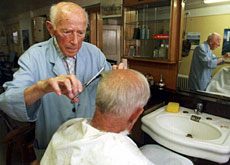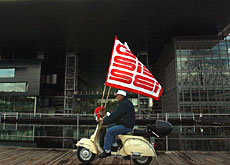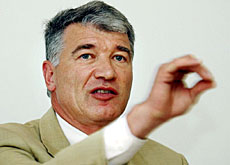Unions threaten autumn of discontent

Switzerland faces the threat of further industrial unrest similar to last November’s walkout by 15,000 construction workers - the biggest strike in 55 years.
Vasco Pedrina, president of the construction workers’ union, told swissinfo that controversial welfare reforms had pushed employees to boiling point.
Unions are incensed by proposals to cut pension benefits and raise the retirement age to 67.
Last month more than 25,000 people protested in the Swiss capital, Bern, against the plans, put forward by the interior minister, Pascal Couchepin, last spring.
Workers’ representatives reject Couchepin’s arguments that such measures are needed to “save” the state pension scheme.
They say an economic upturn would provide adequate revenue for pension commitments, and blame Switzerland’s weak economic performance on the Central Bank’s monetary policy, and market liberalisation.
swissinfo: At the moment pensions and welfare benefits are the hot issues. How do you assess the situation after the massive rally [against pension cuts] last month? What do you tell people who are worried about their pensions?
Vasco Pedrina: The campaign launched by the interior minister, Pascal Couchepin, and his Radical Party has upset the people. Couchepin and his party have spread fear among the population. They still hope that their absurd proposal to increase the retirement age to 67 will be accepted.
Even though it is true that the population is getting older, the costs of the increased number of pensioners could be covered by an economic upswing.
However, if the economic upswing does not happen other sectors will have to make cuts. The average pensioner receives SFr1,700 per month – it would be absurd to save money in this sector.
We must not forget that more and more employees are made redundant before they reach retirement. How are 67 year olds supposed to find work under Couchepin’s proposal?
swissinfo: How would you safeguard social benefits?
V.P.: I think there is some disinformation about the state of the pension scheme. Many people think that Switzerland’s state pension scheme is in the red. That is not true! Since it was first introduced more than 50 years ago it has always been in the black. Only the political will of the parties can secure Switzerland’s state pension scheme.
The trade unions are currently calling on employers to set up agreements allowing employees to remain in employment until at least age 60.
Another way to safeguard pensions would be to increase the working population, which can be achieved by pursuing an appropriate family policy, facilitating the integration of women into working life and, if necessary, employing more foreign workers.
swissinfo: Why has Switzerland’s economy grown more slowly than the economies of other OECD member countries in the past ten years?
V.P.: Switzerland’s long-lasting crisis is mainly due to the tight monetary policy of the Swiss National Bank.
It would be better if the government took on a much more active anti-cyclical role and stopped liberalising and privatising everything – this is not the right way to go.
swissinfo: How do you assess the performances of Pascal Couchepin and the economics minister, Joseph Deiss, over the past year?
V.P.: We are pretty angry with them. Couchepin has managed to question everything that has been achieved in our social welfare state in the past. We are most upset about the attacks on the trade unions, such as increasing the retirement age for example.
Deiss has also disappointed us. We are currently experiencing a recession, unemployment is on the rise (more than 200,000 people are without a job) and our economics minister has so far failed to introduce one single measure to revive the economy.
swissinfo: Parliamentary elections will be held later this month. How important is it for the trade unions to be represented by the centre-left Social Democrats in parliament or government?
V.P.: We have our own policies, which favour employees. It happens frequently that we get support from the more progressive wing of the Social Democrats, for example in the field of social benefits, health insurance or economic policies. However, it is true that we are not always happy with the Social Democrats, especially with the heads of departments or the directors of public services.
swissinfo: Let’s talk about Europe. What do you think about extending the free movement of people to the new EU member countries?
V.P.: We are in favour of the idea, as long as those people coming here from other countries earn the same as the Swiss. In Poland, for example, construction workers only earn one seventh of what workers in Switzerland earn. These conditions must not be introduced to our country.
To put it in a nutshell – we want to open our borders, but in a well-regulated way. We do not want any pressure on our wages and social security.
swissinfo: How do you evaluate the relationship between trade unions and employers?
V.P.: At this time of economic crisis and degeneration “à l’américaine”, the relationship between the social partners has not improved. In fact, it has become very tense. But it differs from sector to sector.
swissinfo: In November last year Swiss construction workers achieved a lowering of their retirement age through staging a national strike. Are more such strikes planned?
V.P.: We already started on September 20 when we staged the biggest national rally in recent decades. If the government does not rethink its social benefits policies it will have to face the consequences.
It is possible that we will intensify our campaigns and we will make a decision when the time is right. We have already shown that we do not just threaten to strike, we act.
swissinfo-interview: Marzio Pescia (translation: Billi Bierling)
Pedrina says pensioners are already being squeezed, and the government should make savings elsewhere.
He says the state pension scheme is not in crisis, and that an economic upturn would provide adequate revenue for pension commitments.
Pedrina blames Switzerland’s weak economic performance on the Central Bank’s monetary policy, and market liberalisation.
The state pension system was created in 1948.
At the time there were 6.5 workers for every pensioner; this year there are four; and in 2030 there will be just two.
The interior minister wants to cut pension benefits and increase the retirement age to 67.

In compliance with the JTI standards
More: SWI swissinfo.ch certified by the Journalism Trust Initiative




You can find an overview of ongoing debates with our journalists here. Please join us!
If you want to start a conversation about a topic raised in this article or want to report factual errors, email us at english@swissinfo.ch.